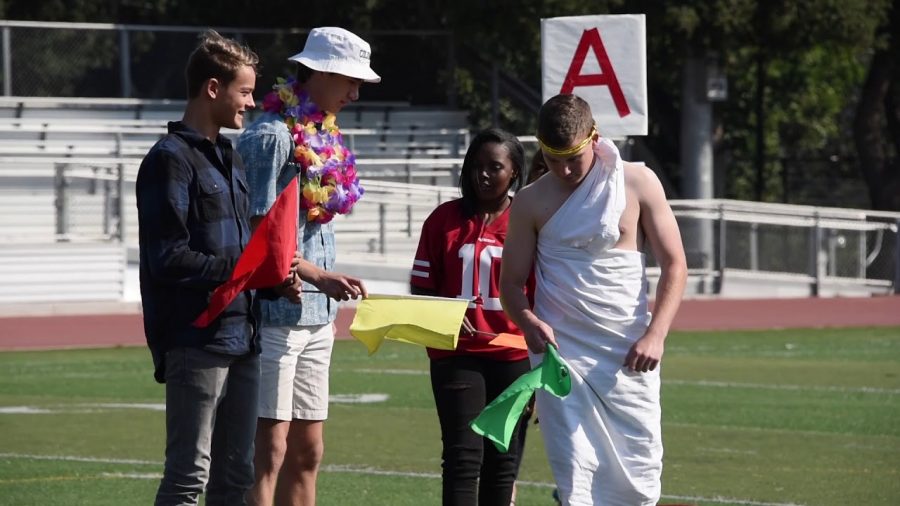ASB Revises Insensitive Spirit Week Theme
After calls from students to rethink the “Hawaiian Day” theme, ASB takes steps to make Spirit Week more inclusive
Four 2019 Paly students dress up for Salad Dressing Day. From left to right: Cowboys, Thousand Island, Sports Wear, and Togas. Photo by Ethan Chen.
Tuesday is salad dressing day. For some, the colorful, fun Hawaiian beachwear is nothing but that, colorful and fun. However, the “Thousand Island” theme has more sinister undertones of cultural appropriation for many students.
After years of debate and controversy around this theme, ASB has finally decided to revise the decades-old tradition.
“Generally, the theme is just not appropriate,” junior class president Ashley Hung said. “We decided that we really wanted to make the change this year.”
According to Hung, ASB has decided to rebrand from “Hawaiian Day” to “Beach Day,” while still keeping the Thousand Island theme.
“Beach Day” is actually what the original theme was intended to be, Hung said. It eventually morphed into a more Hawaiian theme, which introduced the culturally insensitive undercurrent.
“People … are taking from the various Hawaiian cultures, but not actually appreciating them,” Hung said.
Some question where the line is between cultural appropriation and cultural appreciation.
ThoughtCo defines appropriation as, “The adoption of certain elements from another culture without the consent of people who belong to that culture.” But many, including Hung, believe this issue is far more nuanced than can be summed up by one sentence.
Hung says she believes taking time to recognize a culture is the key to avoiding insensitivity.
“Appreciation is understanding the cultures and taking time to fully become aware of the impact that your certain action may have on that culture,” she said.
According to Hung, ASB faced minimal hate for its decision, receiving support from students, parents, and administration alike. But an opt-in digital poll by the Journalism Incubator last week to the Paly student body told a different story.
Despite Hung’s assertion that most wanted the theme change, around 70% of the 91 students who responded indicated they were apathetic or didn’t care about the rebrand, and only 16 students supported the decision.
“I do not think I have heard a single person complain about it who is actually a Pacific Islander,” stated one 11th-grader in response to a survey.
Another respondent, a senior, believes the theme change is crossing a line.
“We have to find a balance between being a safe environment and having fun … ideas such as these have crossed the line in terms of finding anything and everything offensive in some way,” stated the senior.
At the same time, much of the response was positive. One student suggested this change is a part of a wider shift in awareness of cultural insensitivity.
“Recently, we’ve been doing some reflection and introspection, which led many people to question … if it was cultural appropriation or making fun of someone else’s culture,” stated one junior. “Even if you could argue that it wasn’t, there are many more options for a theme relating to it, like Beach Day.”
Student opinions are definitely a mixed bag, but among those who support the theme alteration, some wonder how to stop themes like this from existing in the first place.
Hung says she believes listening to diverse points of view in ASB, and in the student body, is a first step.
“It’s important that we make it a whole ASB conversation because we have a lot of … different perspectives,” she said.
Hung also advocates that students use the ASB suggestion box on palyasb.com, to call out any future cultural appropriation that may occur.
“We want to hear as many people’s voices as we can and reach people because, in the end, we’re representing the student body,” she said.
